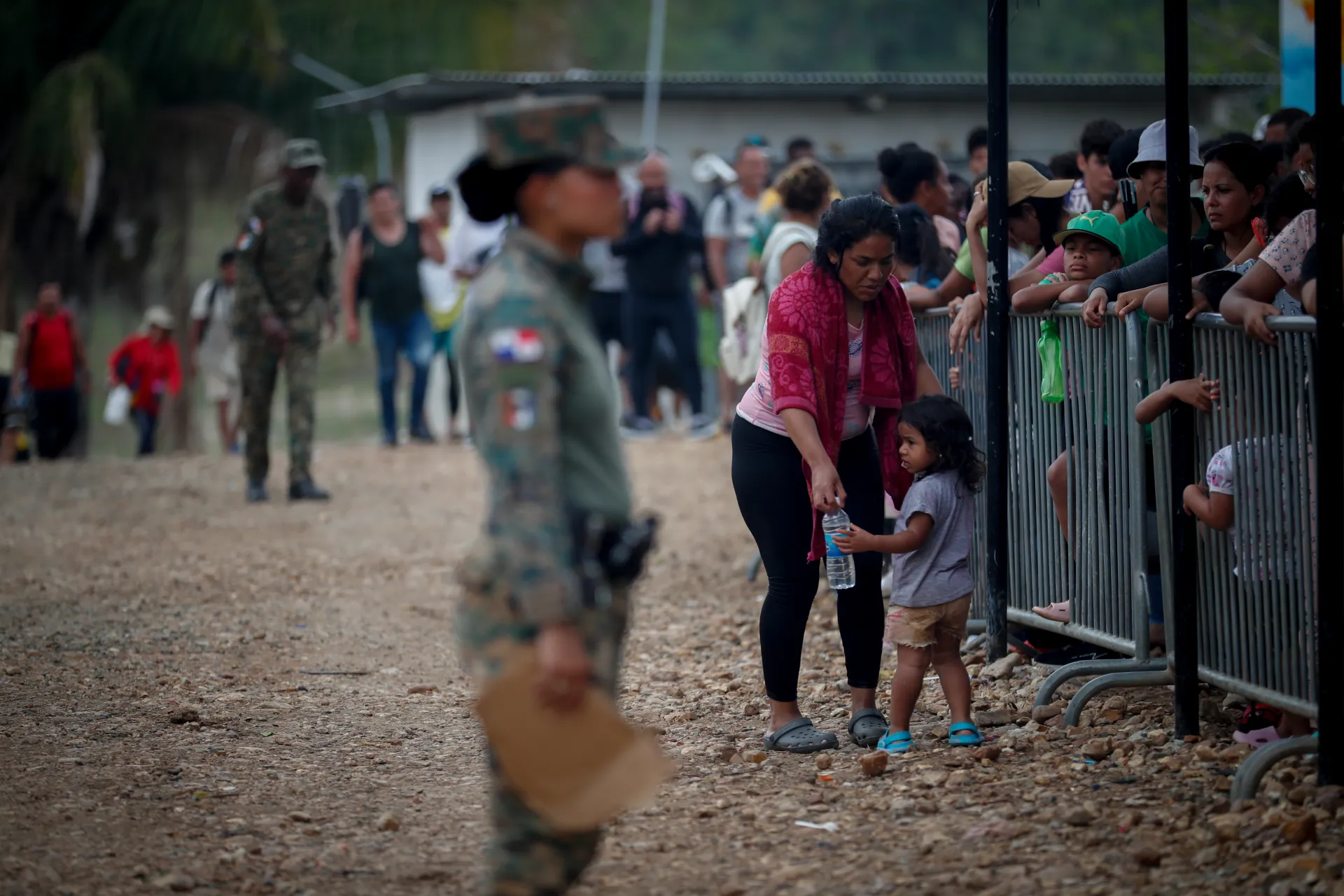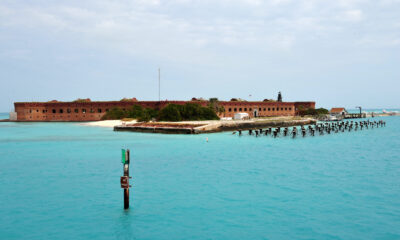International
Migrant women, victims of theft, rape and with their children in tow for the Darién

Migration has long ceased to be a thing for men. Women alone, with children or with their partners leave their homes behind having to go through a “hell” like the Darién jungle, where they are victims of rape or robberies while carrying their children: “come on, there is little left.”
At the checkpoint of Bajo Chiquito, the first indigenous town that migrants arrive at after crossing the Darién jungle, the natural border between Panama and Colombia, the Panamanian authorities take the data of the hundreds of newcomers who, exhausted, are waiting for patients in their turn. Behind the officials, apart, sits a girl. Suddenly, it seems that he has identified someone in the queue.
“Do you know this girl?” the officer tells a woman. “Are you 12 years old?” she replies. They ask the girl and she nods. The officer then asks him if he knows where his mother is. “Yes, it’s coming further back.”
Venezuelan Karely Salazar, 31, travels with her daughters, 7, 10 and 12 years old. They have gone to the village outpatient clinic. The older girl smiles, protective with one of her sisters. The mother holds the other in her arms. “Right now I have this smaller one with a fever, with a cold fever, a two-day-old girl stuck in the river,” the woman explains to EFE, exhausted. “The father of them is in Venezuela,” he clarifies, without giving details.
“Thank God we crossed the jungle, but it really wasn’t easy, very difficult for the children,” he says. Children have to be climbed by stones, if you slip they can fall into the void, into the river, “and they go hungry, and they get cold,” and they can get ahead or stay behind.
“Did your eldest daughter get lost?” “Yes,” the mother nods, and her face changes. She says that the second day of walking she felt very bad on one leg, she couldn’t move, and the little girl walked among the people and “lost her way.”
“I didn’t sleep last night, because the girl got ahead of me and reached a part of the river that had to stop and she woke up there and I still woke up inside the jungle. Last night I cried and cried because I didn’t know where I was,” says the mother.
Try to explain yourself, to make it understood: “I came alone and with three girls, imagine, pull here, pending this one, take care that you fall, but no, the jungle is really not recommended, really not.”
Hundreds of migrants, or thousands, pass through that jungle every day when the flow is highest.
According to data from the Panamanian authorities, after the historical record of more than 520,000 migrants who crossed the Darién in 2023, so far this year more than 130,000 have already done so, including about 104,000 adults, of which about 35% are women. And among the more than 28,600 minors, 47% are girls.
The Panamanian authorities generally maintain a harsh speech against migration, remembering that on the Colombian side the control is held by the criminal group of the Gulf Clan, which in 2023 received about 68 million dollars for the passage of the migrants, in addition to other gangs that steal and attack those who pass by.
The director of Migration of Panama, Samira Gozaine, goes further: “There are stories of people who say that mothers put the children to drown in the river because it weighs heavily on them, when (…) the hills become very dense and they can’t continue, they simply abandon them to their fate,” she told EFE a year ago.
For the internationalist lawyer and human rights activist Iván Chanis, this type of speech “dehumanizes” and moves away from reality, because, as he explains to EFE, “what mother wants to leave her daughter behind?”
Luisannys Mundaraín, 22 years old, carries her baby in her arms. It gives him breastfeed. He tells EFE that when he crossed one of the cliffs with the baby, he slipped, but he was able to hold on at the last moment. To which were added the snakes, spiders, rivers, and “the thieves who steal one, also rape women.”
Mundaraín then recounts how his group was intercepted in “a ridge” by a group of armed hooded people, who asked him for “100 dollars for each, and the one who did not give him the money had to deliver the phone, if it was not an iPhone no, or if it was a woman he had to stay there, you know what for.”
Doctors Without Borders (MSF) assured, before the Panamanian authorities vetoed them from continuing to provide medical care in the country, that they treated more than 1,300 people for sexual violence in the Darién between April 2021 and January 2024.
“What you live in is a total hell,” says the young woman, but the crisis in Venezuela gave her no other option, with 12-hour work in a supermarket for 20 dollars a week, when “a pack of diapers was that if at 5 dollars and the most expensive food.”
Thus, when in the election campaign some Panamanian politicians were heard saying that they wanted to close the 266 kilometers of border in Darién, the young woman sighed.
“Something impossible to close it, because that way there are thousands of dangers, migrants will always continue to go through what they suffer in those countries, we are poor. They will always keep happening, risking their lives, the children, everything,” he concludes.
Central America
Senator Van Hollen Meets with Deported MS-13 Member in El Salvador; Trump and Bukele React

U.S. Democratic Senator Chris Van Hollen, representing the state of Maryland, held a meeting in El Salvador with deported MS-13 gang member Kilmar Ábrego García, a member of the criminal group classified by the U.S. government as a terrorist organization.
“Kilmar Ábrego García, miraculously resurrected from the ‘extermination camps’ and ‘torture chambers,’ now sipping margaritas with Senator Van Hollen in the tropical paradise of El Salvador!” wrote President Nayib Bukeleon X (formerly Twitter), sharing photos of Van Hollen, Ábrego García, and a lawyer sitting together at a Salvadoran hotel.
The deported gang member is seen wearing a plaid shirt and a flat-brimmed cap, seated at a table with glasses and coffee cups. The senator also shared images of the meeting on his own social media accounts.
Bukele reaffirmed that Ábrego will remain in El Salvador and will not be returned to the United States.
“Now that his health has been confirmed, he has earned the honor of remaining under the custody of El Salvador,” Bukele added.
Former U.S. President Donald Trump criticized the senator’s meeting with Ábrego on Truth Social, calling Van Hollen “a fool” for advocating for Ábrego’s return to the U.S.
International
Pope Francis Appears for Easter Blessing, Calls for Peace and Religious Freedom

Pope Francis, still recovering from pneumonia, appeared on the balcony of St. Peter’s Basilica in the Vatican on Easter Sunday and, with a faint voice, wished a “Happy Easter” to the thousands of faithful gathered to celebrate the Resurrection of Christ.
A month after being discharged from a lengthy hospital stay, the presence of the 88-year-old pontiff had remained uncertain, with the Vatican not confirming his attendance ahead of time.
Eventually, the pope made a brief appearance in a wheelchair shortly after 12:00 p.m. (10:00 GMT) to deliver his traditional “Urbi et Orbi” blessing (“to the city and to the world”).
Although no longer wearing an oxygen cannula, the Argentine Jesuit relied on a close aide to read his Easter message, which touched on major global conflicts.
Francis condemned the “dramatic and unworthy humanitarian crisis” in Gaza and called for a ceasefire, while also expressing concern over the “growing climate of antisemitism spreading across the globe.”
He further emphasized the importance of religious freedom and freedom of thought, stating that without mutual respect, “peace is not possible.”
International
Thousands rally nationwide against Trump’s threat to U.S. democracy

Thousands of protesters gathered on Saturday (April 19, 2025) in major cities like New York and Washington, as well as in small communities across the United States, in a second wave of demonstrations against President Donald Trump. The crowds denounced what they view as growing threats to the country’s democratic ideals.
In New York City, demonstrators of all ages rallied in front of the Public Library near Trump Tower, holding signs accusing the president of undermining democratic institutions and judicial independence.
Many protesters also criticized Trump’s hardline immigration policies, including mass deportations and raids targeting undocumented migrants.
“Democracy is in grave danger,” said Kathy Valyi, 73, the daughter of Holocaust survivors. She told AFP that the stories her parents shared about Adolf Hitler’s rise to power in 1930s Germany “are happening here now.”
In Washington, demonstrators voiced concern over what they see as Trump’s disregard for long-standing constitutional norms, such as the right to due process.
-

 International4 days ago
International4 days agoArsenal stun Real Madrid at the Bernabéu to reach Champions League semifinals
-

 Central America3 days ago
Central America3 days agoNicaraguan Exiles to Mark 7th Anniversary of 2018 Protests with Global Commemorations
-

 International3 days ago
International3 days agoDominican ‘False Hero’ Arrested for Faking Role in Nightclub Collapse That Killed 231
-

 International2 days ago
International2 days agoACLU seeks emergency court order to stop venezuelan deportations under Wartime Law
-

 International4 days ago
International4 days agoBogotá residents line up for yellow fever vaccine amid national alert
-

 International4 days ago
International4 days agoDeSantis’ immigration crackdown sparks alarm in Venezuelan Communities in Doral
-

 Central America2 days ago
Central America2 days agoUN complaint filed against Costa Rica over detention of migrant children
-

 International4 days ago
International4 days agoMexico refuses to restore ties with Ecuador while Noboa remains in office
-

 International1 day ago
International1 day agoThousands rally nationwide against Trump’s threat to U.S. democracy
-

 Central America9 hours ago
Central America9 hours agoSenator Van Hollen Meets with Deported MS-13 Member in El Salvador; Trump and Bukele React
-

 International9 hours ago
International9 hours agoPope Francis Appears for Easter Blessing, Calls for Peace and Religious Freedom

















